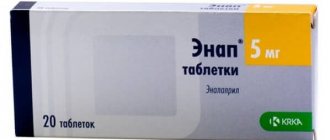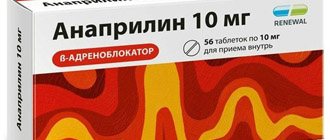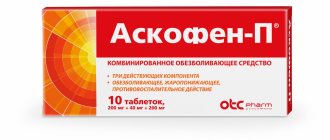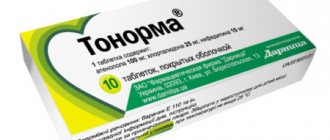Captopril is a drug that belongs to a group of medications that have a hypotensive effect. It actively lowers blood pressure and is used to treat hypertension and prevent its complications.
But not all patients may be suitable for Captopril, due to concomitant chronic diseases or the presence of an allergic reaction to the components of the drug. A large selection of Captopril substitutes allows you to select its corresponding analogue, which acts equally.
pharmachologic effect
Manufacturer: MAKIZ-PHARMA LLC (Russia)
Release form: tablets
Active ingredient: captopril
Analogues: Enap, Corinfar, Cordaflex
Does captopril increase or decrease blood pressure? It has a pronounced vasodilator effect, that is, the ability to lower pressure, which has a positive effect on the vascular wall of the pulmonary capillaries and leads to:
- to increase the minute volume of the heart muscle;
- endurance to stress;
- regression of left ventricular hypertrophy;
- slowing the progression of chronic heart failure;
- reducing the activity of blood clots.
In patients with diabetes, Captopril improves hemodynamics in the glomeruli of the excretory system, which leads to the prevention of nephropathy.
Indications for use of Captopril
Captopril is used in practice in the treatment of the following pathological processes:
- arterial hypertension;
- heart failure of varying severity;
- dysfunction of the left ventricle as a consequence of a heart attack;
- nephropathy due to type 1 diabetes mellitus.
The drug can be prescribed either in the singular or as part of complex therapy, depending on the activity of the pathological process and its type.
Captopril - instructions for use
According to the instructions for use, tablets are prescribed at 6.25-12.5 mg 2-3 times a day. If the therapeutic effect is not sufficiently pronounced, the dose is increased to 25–50 mg 3 times a day. The maximum dosage of the drug is 150 mg per day.
How to take Captopril - before or after meals?
The best option for using the drug is to take it 50–60 minutes before meals.
Captopril, how to take - under the tongue or swallow
According to the instructions, the drug tablet is swallowed whole and washed down with water. It cannot be dissolved under the tongue and crushed. To better dissolve the tablet in the stomach, you need to drink enough water, that is, wash down the drug with half a glass of liquid.
Analogues according to indications and method of use
If the patient has certain contraindications to taking the substance captopril, then analogues are selected according to the following criteria:
- Indications for use (arterial hypertension, chronic heart failure, history of heart attack).
- Mechanism of action (vasodilator and antispasmodic effect).
- Method of administration (medicines are taken internally, starting with a minimum dose, gradually increasing it to the maximum).
Substitutes may contain various auxiliary components, as pharmacologists try to modify drugs to achieve maximum therapeutic effectiveness. Therefore, when choosing an analogue, you need to carefully study the instructions to clarify the composition in order to reduce the risk of developing individual intolerance to the drug.
Berlipril
The drug contains an active component - enalapril, which, when entering the body, is converted into enalaprilat under the action of enzymes, thereby blocking the conversion of the hormone that causes vasoconstriction.
The drug is available in tablet form
As a result, the drug has an anti-vasoconstrictor effect, while reducing peripheral resistance in the circulatory system.
According to the instructions for use of the medicine, it is prescribed for internal use. The tablets are taken in their entirety, regardless of the time of meal, with plenty of water. The dose of the medication is selected taking into account the stage of the pathological process, the severity of symptoms, and the presence of concomitant diseases.
Enalapril Hexal
The active component of the drug is enapril, which eliminates the narrowing of coronary vessels, which can effectively reduce systolic and diastolic blood pressure.
Tablets contain 5 mg of active ingredient
Most of the drug is absorbed in the digestive system, while eating does not affect its activity.
Patients who are concomitantly taking diuretics should consider the possibility of increased hypotensive effects. Thus, when taking the starting dose of Enalapril, the risk of developing arterial hypotension increases.
Before starting treatment, it is necessary to check the functional capacity of the excretory system, since if kidney function is impaired, the single dose should be reduced.
After abrupt withdrawal of the drug, a sharp increase in blood pressure may occur.
Renitek
The active ingredient in the drug is enalapril maleate. The drug is classified as a specific, long-acting ACE inhibitor. Regular use of Renitec helps to increase renal blood flow, while the level of glomerular filtration remains stable.
In people suffering from arterial hypertension, blood pressure normalizes, regardless of the position of the body in space. Complete stabilization of pressure is observed within several weeks from the start of the therapeutic course. An abrupt break in the course of treatment does not cause a sharp increase in blood pressure.
Dapril
The active ingredient in the drug is lisinopril, at a concentration of 20 mg. The effect after taking the tablet occurs after 2 hours, but the maximum concentration of the active component in the bloodstream is achieved after 5 hours and lasts for 24 hours.
For patients diagnosed with hypertension, dose selection is carried out individually depending on blood pressure and the severity of associated symptoms. For patients who have a violation of the functional ability of the excretory system, dose selection should be carried out taking into account creatinine clearance.
Lizoril
The medication contains the active component lisinopril at a concentration of 2.5 mg. The effect of Lisiropril is observed within 60 minutes after taking the tablet; the optimal effect is achieved after 6 hours. The therapeutic effect for arterial hypertension occurs after a two-day course of treatment, and complete stabilization of blood pressure is observed after 1 month.
Analogues of antihypertensive drugs can only be prescribed by a cardiologist or the attending physician, who constantly monitors the patient’s general condition during the entire therapeutic course.
Analogues of Captopril
Thanks to the availability of modern analogues of Captopril, doctors prescribe a number of drugs with a similar mechanism of action and treatment results for the treatment of hypertension. Antihypertensive drugs can replace Captopril in the form of:
- generics;
- combination medications;
- synonyms.
A large selection of analogues of Captopril tablets produced by the pharmaceutical industry expands the doctor’s field of activity. This makes it possible to select antihypertensive drugs for different categories of patients with a complicated medical history.
Table of Captopril analogues with prices and country of origin
| Analogue | Price in rubles | Manufacturer country |
| Lorista | 420-450 | Slovenia |
| Enap | 130-190 | Slovenia |
| Losartan | 110-380 | Russia |
| Corinfar | 110-160 | Israel |
| Cordaflex | 150-180 | Hungary |
| Concor | 140-190 | Germany |
| Amlodipine | 50-140 | Russia |
For the treatment of hypertension, you can purchase domestic and imported analogues of Captopril in various price categories in the pharmacy chain, available both with and without a doctor’s prescription.
Lorista
Manufacturer: KRKA (Slovenia)
Release form: tablets
Active ingredient: hydrochlorothiazide, losartan
The analogue of Captopril Lorista is a drug of combined action that gives a hypotensive result. The drug effectively lowers systolic and diastolic blood pressure and controls its levels within 24 hours. The action of the analogue leads to:
- to reduce the load on the heart muscle due to the diuretic effect;
- slowing the development of chronic heart failure;
- increasing physical endurance;
- preventing the development of left ventricular hypertrophy.
The drug has no effect on the number of heart contractions. The medicine is taken 50–100 mg 1 time per day, regardless of meals. The greatest effect from taking the drug is achieved after 3 weeks.
Enap
Manufacturer: KRKA (Slovenia)
Release form: tablets
Active ingredient: enalapril
This is an analogue of Captopril with antihypertensive action, having 1 active substance. Enap has a vasodilating effect, which helps to increase the minute volume of blood flow in the heart muscle and resistance to stress. Long-term use of the drug leads to regression of functional deficiency and its severity.
In case of left ventricular dysfunction, the Enap analog has a positive effect on the dynamics of the process, preventing the development of complications of hypertension (myocardial infarction) and reducing attacks of angina. The initial dosage of the drug is 2.5-5 mg per day, followed by an increase to 10-20 mg in 2 doses per day.
Losartan
Manufacturer: GEDEON RICHTER (Hungary)
Release form: tablets
Active ingredient: losartan
The analogue Captopril Losartan helps reduce the risk of developing chronic heart failure, accompanied by a violation of the muscular structure of the left ventricle. The drug prevents the worsening of hypertension and its consequences such as stroke and myocardial infarction.
Losartan actively reduces blood pressure in patients with type 2 diabetes mellitus due to improved hemodynamics and the condition of the vascular wall of the capillary network. The therapeutic dose of the analogue is 50 mg per day, which can be increased according to indications to 100 mg per day.
Corinfar
Manufacturer: TEVA Pharmaceutical Industries (Israel)
Release form: tablets
Active ingredient: nifedipine
The drug not only provides a good hypotensive effect, but also has a positive effect on various forms of angina. Corinfar helps reduce angina attacks and make them easier. The drug increases blood supply to the heart muscle, especially in the area of ischemia, due to myocardial infarction.
This analogue of Captopril can be used in patients suffering from chronic renal failure. The initial dose of the drug is 10 mg 2-3 times a day. To enhance the therapeutic effect, the dosage of Corinfar can be gradually increased to 20 mg 1-2 times a day.
Cordaflex
Manufacturer: EGIS Pharmaceuticals (Hungary)
Release form: tablets
Active ingredient: nifedipine
An analogue of Captopril, the drug Cordaflex, is prescribed for the treatment of arterial hypertension complicated by coronary heart disease (CHD). The drug actively prevents the development of angina attacks, and is also indicated for Raynaud's syndrome, which develops as a result of impaired vascular tone.
The antihypertensive drug can be used in patients suffering from chronic renal failure, as well as in patients undergoing hemodialysis treatment. The initial dosage of the Cordaflex analogue is 20 mg 2 times a day, which can be increased to 40 mg 2 times a day.
Concor
Manufacturer: MERCK KGaA (Germany)
Release form: tablets
Active ingredient: Bisoprolol
Concor belongs to the group of selective beta-blockers. The drug helps reduce the heart rate, which leads to a decrease in the oxygen demand of the heart muscle. The analogue Captopril Concor is indicated for the treatment of hypertension, coronary artery disease, accompanied by the presence of stable angina.
The initial dosage of the drug is 5 mg 1 time per day, taking into account the number of heartbeats and the general condition of the patient. According to indications, the dose of the drug can be increased to 10 mg per day.
Amlodipine
Manufacturer: KANOPHARMA PRODUCTION (Russia)
Release form: tablets
Active ingredient: amlodipine
Amlodipine has a relaxing effect on the smooth muscles of the vascular wall, which leads to a decrease in left ventricular hypertrophy. The drug prevents the formation of blood clots and is also used as a means of accelerating regenerative processes in the myocardium in coronary heart disease.
For the treatment of hypertension and the prevention of angina attacks against the background of coronary artery disease, the recommended initial dosage of the analogue is 5 mg once a day, which can be increased to 10 mg once a day according to indications.
Analogues in composition
All drug substitutes are selected according to the international drug classification system, that is, taking into account the composition, indications for use, and therapeutic effect.
When selecting the optimal analogue, it is necessary to take into account the concentration of the active substance, the dose, which a cardiologist will help to adjust
The analogues listed below contain the active substance captopril, which has an antihypertensive effect. However, with the same composition of substitutes, they may have different concentrations of the active substance, so the patient must decide which is better in the treatment of arterial hypertension.
Analogues selected according to their chemical structure are the most suitable substitutes.
Captopril substitutes identical in chemical composition of the active component
Angiopril
Belongs to the group of ACE inhibitors. Promotes the expansion of large arteries, thereby reducing the load on the myocardium. The hypotensive effect does not depend on the concentration of the hormone that increases blood pressure, since stabilization of blood pressure occurs with both normal and reduced renin levels.
With long-term use of the drug, the myocardial walls are restored and blood circulation in the necrotic area of the heart muscle is improved.
The decrease in pressure is not accompanied by an attack of tachycardia and does not lead to a decrease in the oxygen demand of the heart muscle. The duration of the hypotensive effect is achieved by increasing the dose of the drug.
Blockordil
It is a modern drug from the group of ACE inhibitors. It has a pronounced hypotensive effect and prevents narrowing of the walls of blood vessels.
An optimal decrease in blood pressure is observed within an hour after taking the tablet. The duration of the effect is about 11 hours. The maximum therapeutic effect is achieved within 1 month from the start of using the product.
Normopres
A combined drug that has an antihypertensive effect. It contains a certain concentration of the active component captopril and hydrochlorothiazide. Used for arterial hypertension.
The dosage of the drug is selected individually, depending on the severity of the clinical picture. Tablets are taken 60 minutes before meals, since the presence of food in the digestive tract slows down the absorption of the active components.
Achievement of the maximum therapeutic effect occurs after 6–8 weeks. It is recommended to adjust the dose after 1.5 months from the start of the therapeutic course, if symptoms do not require a rapid increase in dosage.
Captopril or Capoten - which is better during a crisis
Manufacturer: Chemical and pharmaceutical plant AKRIKHIN (Russia)
Release form: tablets
Active ingredient: captopril
Both drugs are prescribed for the treatment of hypertension and have the same active substance, the result of which is an equivalent therapeutic effect. Indications and contraindications for the use of Captopril and its analogue will be similar. But there is a difference between antihypertensive drugs, which is:
- in the quantitative and qualitative content of additional ingredients included in each preparation;
- in the cost of medicines.
Despite some differences, Captopril will be more effective for stopping a hypertensive crisis, since the drug gives a quick effect. According to doctors, Capoten acts more gently. In any case, the choice between drugs will depend on the doctor and the patient’s condition.
Reviews
Antonina Petrovna, 60 years old As prescribed by a cardiologist, I have been taking Captopril for 1 year; the medicine is inexpensive and accessible to pensioners. However, its long-term use is contraindicated and is recommended only in exceptional cases with a sharp increase in blood pressure. The attending physician tried to select a high-quality, inexpensive analogue that would correspond to the stage of the disease. The choice was made on Enalapril Darnytsia, I am satisfied with the results.
Gennady, 47 years old I took Captorpil for 2 years; at the beginning of treatment, it helped bring my blood pressure back to normal when taking the minimum dose. Subsequently, the dosage had to be increased, since the usual concentration did not give the necessary hypotensive effect. The doctor recommended replacing the medicine with its analogue (lisinopril), which has a prolonged effect. The drug helps to quickly stabilize blood pressure levels without causing palpitations. After using the tablets, I did not find any side effects.
Varvara, 40 years old After experiencing side effects from taking Captopril, I tried to replace it with the medication Enalapril Hexal. The only drawback of the product is that it does not have a long-term effect, so it must be taken 2 times a day. At the moment I am using the minimum dosage, it helps maintain normal blood pressure and does not cause complications.
Captopril or Enalapril
Manufacturer: VALENTA PHARMACEUTIKA (Russia)
Release form: tablets
Active ingredient: enalapril
In therapeutic practice, both drugs are used for long-term treatment of chronic cardiovascular pathology. But the effect of Enalapril treatment will be stronger. This analogue of Captopril is well tolerated by patients and stably maintains blood pressure, preventing its surges.
Captopril is more suitable for a short course of treatment, that is, with the development of a hypertensive crisis. It is also more effective in the treatment of hypertension with concomitant diabetes mellitus. It has been proven that Captopril increases the sensitivity of cellular structures to insulin, compared to other antihypertensive drugs and ACE inhibitors.
Captopril
Before starting, and regularly during treatment with captopril, blood pressure and renal function should be monitored. In patients with CHF, the drug is used under close medical supervision.
Arterial hypotension
In patients with arterial hypertension, when using captopril, severe arterial hypotension is observed only in rare cases; the likelihood of developing this condition increases with increased loss of fluid and salts (for example, after intensive treatment with diuretics), in patients with CHF or on dialysis.
The possibility of a sharp decrease in blood pressure can be minimized by first withdrawing (4-7 days before) the diuretic or increasing the intake of sodium chloride (table salt) (about a week before starting treatment), or by using captopril at the beginning of treatment in small doses (6 ,25-12.5 mg/day). When using antihypertensive drugs, a pronounced decrease in blood pressure in patients with cerebrovascular accidents and cardiovascular diseases may increase the risk of myocardial infarction or stroke.
Renal dysfunction
Some patients with kidney disease, especially those with severe renal artery stenosis, experience increases in serum urea nitrogen and creatinine concentrations after lowering blood pressure. This increase is usually reversible when captopril therapy is discontinued. In these cases, it may be necessary to reduce the dose of captopril and/or discontinue the diuretic.
With long-term use of captopril, approximately 20% of patients experience an increase in serum urea and creatinine concentrations by more than 20% compared to normal or baseline values. In less than 5% of patients, especially with severe nephropathy, treatment discontinuation is required due to an increase in creatinine concentration.
Renovascular hypertension
Patients with bilateral renal artery stenosis or stenosis of the artery of a solitary kidney have an increased risk of developing arterial hypotension and renal failure when using ACE inhibitors. Renal failure may initially manifest itself as only slight changes in plasma creatinine levels. The use of captopril in such patients is not recommended.
Kidney transplant
There is no experience with the use of captopril in patients who have recently undergone kidney transplantation. Therefore, the use of captopril in such patients is not recommended.
Proteinuria
When using captopril, 0.7% of patients had proteinuria more than 1000 mg per day. In 90% of cases, proteinuria occurred in patients with impaired renal function, as well as when using high doses of captopril (more than 150 mg per day). Approximately 20% of patients with proteinuria developed nephrotic syndrome. In most cases, proteinuria disappeared or decreased in severity after taking captopril within 6 months, regardless of whether the drug was stopped or not. Renal function tests (blood urea nitrogen and creatinine concentrations) in patients with proteinuria were almost always within normal limits. In patients with kidney disease, the protein content in the urine should be determined before starting therapy and periodically throughout the course of therapy.
Liver dysfunction
In rare cases, while taking ACE inhibitors, a syndrome of development of cholestatic jaundice with transition to fulminant liver necrosis, sometimes with death, was observed. The mechanism of development of this syndrome is unclear. If jaundice or a significant increase in the activity of liver enzymes occurs while taking ACE inhibitors, you should stop taking the drug (see section “Side Effects”), the patient should be under appropriate medical supervision.
Hyperkalemia
Hyperkalemia may develop during treatment with ACE inhibitors, including captopril. Risk factors for hyperkalemia are renal failure, decreased renal function, age over 70 years, diabetes mellitus, some concomitant conditions (dehydration, acute heart failure, metabolic acidosis), concomitant use of potassium-sparing diuretics (such as spironolactone and its derivative eplerenone, triamterene, amiloride) , potassium supplements/preparations or potassium-containing table salt substitutes, as well as the use of other drugs that increase potassium levels in the blood (for example, heparin).
The use of potassium supplements/preparations, potassium-sparing diuretics, and potassium-containing table salt substitutes can lead to a significant increase in potassium levels in the blood, especially in patients with reduced renal function. Hyperkalemia can cause serious, sometimes fatal, abnormal heart rhythms.
If simultaneous use of captopril and the above drugs is necessary, treatment should be carried out with caution against the background of regular monitoring of potassium levels in the blood serum (see section “Interaction with other drugs”).
Hemodialysis
In patients undergoing hemodialysis using high-flux membranes (for example, AN69®), cases of anaphylactic reactions have been reported during therapy with ACE inhibitors. The use of ACE inhibitors should be avoided when using this type of membrane.
Neutropenia / agranulocytosis / thrombocytopenia / anemia
While taking ACE inhibitors, neutropenia/agranulocytosis, thrombocytopenia and anemia may occur. In patients with normal renal function and in the absence of other aggravating factors, neutropenia rarely develops. Captopril should be used with extreme caution in patients with systemic connective tissue diseases, while taking immunosuppressants, allopurinol or procainamide, especially in patients with impaired renal function. Due to the fact that the majority of fatal cases of neutropenia due to ACE inhibitors developed in such patients, the number of leukocytes in their blood should be monitored before starting treatment, in the first 3 months of therapy - every 2 weeks, then every 2 months.
If the number of leukocytes is below 4000/μl, a repeat general blood test is indicated; below 1000/μl, the drug is stopped while monitoring the patient continues.
Typically, restoration of the number of neutrophils occurs within 2 weeks after discontinuation of captopril. In 13% of cases of neutropenia, death was noted. In almost all cases, fatal neutropenia was observed in patients with systemic connective tissue diseases, renal or heart failure, while taking immunosuppressants, or a combination of both of these factors.
Some patients developed severe infections, in some cases resistant to intensive antibiotic therapy. When using captopril, such patients are advised to periodically monitor the white blood cell count. Patients should report any signs of infectious diseases (eg, sore throat, fever) to their doctor.
Cough
During therapy with an ACE inhibitor, a persistent non-productive dry cough may occur, which stops after discontinuation of the drug. This should be taken into account when carrying out the differential diagnosis of cough.
Surgery/general anesthesia
The use of ACE inhibitors in patients undergoing surgery under general anesthesia can lead to a significant decrease in blood pressure, especially when using drugs for general anesthesia that have an antihypertensive effect. If arterial hypotension develops, blood pressure should be maintained by replenishing blood volume. It is necessary to warn the surgeon/anesthesiologist that the patient is taking ACE inhibitors.
Mitral stenosis/aortic stenosis/hypertrophic obstructive cardiomyopathy
It is not recommended to use captopril in patients with left ventricular outflow tract obstruction, as well as in patients with mitral stenosis (see section "Contraindications").
Hypersensitivity/angioedema
When taking ACE inhibitors, including captopril, in rare cases and during any period of therapy, the development of angioedema of the face, upper and lower extremities, lips, mucous membranes, tongue, vocal folds and/or larynx may be observed (see section “Side effects”). action"). If symptoms appear, the drug should be stopped immediately and the patient should be observed until signs of edema completely disappear. If the swelling affects only the face and lips, it usually resolves on its own, although antihistamines may be used to treat symptoms.
Angioedema, accompanied by swelling of the larynx, can be fatal. Swelling of the tongue, vocal folds, or larynx can lead to airway obstruction. When such symptoms appear, emergency treatment is required, including subcutaneous administration of epinephrine (adrenaline) and/or ensuring airway patency. The patient should be under medical supervision until symptoms disappear completely and permanently.
Patients with a history of angioedema not associated with taking ACE inhibitors may have an increased risk of developing it when taking medications of this group (see section “Contraindications”).
In rare cases, angioedema of the intestine develops during therapy with ACE inhibitors. In this case, patients experience abdominal pain as an isolated symptom or in combination with nausea and vomiting, in some cases without previous angioedema of the face and with normal Cl-esterase levels. The diagnosis was made using abdominal computed tomography, ultrasound, or surgery. Symptoms disappeared after stopping the ACE inhibitors. Therefore, in patients with abdominal pain receiving ACE inhibitors, when carrying out differential diagnosis, it is necessary to take into account the possibility of developing angioedema of the intestine (see section “Side effects”).
Anaphylactoid reactions during low-density lipoprotein (LDL) apheresis
In rare cases, life-threatening anaphylactoid reactions may occur in patients receiving ACE inhibitors during LDL apheresis using dextran sulfate. To prevent an anaphylactoid reaction, ACE inhibitor therapy should be temporarily discontinued before each apheresis procedure.
Anaphylactoid reactions during desensitization
There are isolated reports of the development of anaphylactoid reactions in patients receiving ACE inhibitors during desensitizing therapy, for example, with hymenoptera venom. ACE inhibitors should be used with caution in patients susceptible to allergic reactions undergoing desensitization procedures. The use of ACE inhibitors should be avoided in patients receiving bee venom immunotherapy. However, this reaction can be avoided by temporarily discontinuing the ACE inhibitor before starting the desensitization procedure.
Ethnic differences
It should be taken into account that patients of the Negroid race have a higher risk of developing angioedema. Like other ACE inhibitors, captopril is less effective in lowering blood pressure in black patients.
This effect may be associated with a pronounced predominance of low-renin status in black patients with arterial hypertension.
Patients with diabetes mellitus
When using the drug in patients with diabetes mellitus receiving hypoglycemic agents for oral administration or insulin, during the first month of therapy it is necessary to regularly monitor the concentration of glucose in the blood (see section “Interaction with other drugs”).
The simultaneous use of ACE inhibitors and ARB II in patients with diabetic nephropathy is contraindicated.
Lithium preparations
The simultaneous use of captopril and lithium preparations is not recommended (see section “Interaction with other drugs”).
Double blockade of the RAAS
Cases of hypotension, syncope, stroke, hyperkalemia and renal dysfunction (including acute renal failure) have been reported in susceptible patients, especially when used concomitantly with drugs that affect this system. Therefore, double blockade of the RAAS by combining an ACE inhibitor with an ARA II or aliskiren is not recommended.
Concomitant use of ACE inhibitors with medicinal products containing aliskiren is contraindicated in patients with diabetes mellitus and/or moderate or severe renal impairment (GFR < 60 ml/min/1.73 m2 body surface area) (see sections "Contraindications" and "Interaction with other drugs"). The simultaneous use of ACE inhibitors and ARB II is contraindicated in patients with diabetic nephropathy and is not recommended in other patients.
When using captopril, a false-positive reaction may occur in a urine test for acetone.
Captopril or Moxonidine - which is better during a crisis
Manufacturer: KANOPHARMA PRODUCTION (Russia)
Release form: tablets
Active ingredient: moxonidine
Both drugs have a hypotensive effect. Moxonidine is recommended to be taken if blood pressure is consistently high. Analogue courses are accepted.
With prolonged use, side effects may occur. They go away after stopping Moxonidine. Withdrawal of the drug should be carried out gradually, reducing the dosage. During a crisis, the best and fastest result is observed from the use of Captopril.
Captopril or Andipal
Manufacturer: USOLYE SIBIRSKY CHIMPHARMZAVOD (Russia)
Release form: tablets
Active ingredients: metamizole, phenobarbital, papaverine, bendazole
Both drugs differ in their composition and active substance. Andipal belongs to the group of antispasmodics and has a vasodilating effect. This analogue is intended to reduce pressure that appears as a result of a stress reaction to an irritating factor or vascular spasm.
Captopril is prescribed for hypertension occurring against the background of left ventricular hypertrophy, that is, dysfunction of the heart muscle.
Captopril or Lisinopril – which is better?
Manufacturer: OXFORD Laboratories (India)
Release form: tablets
Active ingredient: lisinopril
Both medications are used in cardiology to normalize blood pressure. But there are a number of significant differences between them, such as:
- different active ingredients and components included in the preparations;
- different periods of blood pressure reduction.
Captopril is more suitable for quickly relieving pressure surges. Its analog Lisinopril has the following advantages:
- the hypotensive effect lasts more than a day, which eliminates the morning pressure surge;
- the risk of diabetes mellitus is reduced;
- the development of complications of hypertension is prevented.
Lisinopril for long-term course treatment will be better than Captopril.
Inexpensive analogues
On the pharmacological market there are inexpensive analogues of the drug that have the same quality characteristics and effectiveness, but are much cheaper in cost than the original drugs.
Cheap drug analogues can provide significant assistance in the treatment of arterial hypertension
When producing substitutes for expensive substitutes, you must follow some rules:
- Compliance with the proportion of active substances, that is, their concentration and quality indicators.
- Compliance with international standards.
- Maintaining an equivalent to the original in terms of speed and degree of suction.
When purchasing a cheap antihypertensive analogue, patients should be careful, since there is a risk of buying a counterfeit, which contains a low-quality active component. Such a remedy may be ineffective in the fight against high blood pressure and have many side effects.
Enalapril
Enalapril tablets are intended for daily use, which allows you to normalize blood pressure levels throughout the day. Thanks to the prolonged action, the patient can take only one tablet per day. With long-term use of the drug, pressure stabilizes, reducing the risk of sudden changes in the direction of increase or decrease.
The medication, unlike other substitutes, has a milder effect, but at the same time has a prolonged effect
The medicine is not used to provide emergency assistance in relieving an arterial crisis.
As a rule, Enalapril is combined with other drugs that are aimed at eliminating arterial hypertension, improving excretory function, and restoring cardiac activity.
Lisinopril
The antihypertensive effect occurs 60 minutes after taking the required dose, reaching the maximum concentration of the active substance is noted after 5 hours.
The cost of the product depends on the dosage of the active ingredient and the number of tablets in the package
The tableted drug is intended for combination therapy, in combination with other antihypertensive medications. When treating elderly patients, you should be careful, as they have impaired absorption of lisinopril.
Enam
Inexpensive but effective antihypertensive drug. Enam reduces blood pressure due to its mild diuretic effect.
The chemical composition of the tablets varies depending on the concentration of the main active ingredient
The medication helps stimulate the circulatory system and respiratory function of the body, and also normalizes blood flow in the renal arteries.
Before starting the therapeutic course, it is necessary to discontinue diuretics, as well as medications containing potassium, since Enam prevents the excretion of the microelement from the body.
Captopril or Nifedipine
Manufacturer: OZONE (Russia)
Release form: tablets
Active ingredient: nifedipine
Both drugs provide a rapid hypotensive effect. Nifedipine, unlike Captopril, does not have antiarrhythmic activity and does not inhibit the conductivity of the heart muscle. Taking the Nifedipine analogue improves coronary blood flow.
Captopril or Physiotens – which is better?
Manufacturer: ABBOTT Laboratories (Germany)
Release form: tablets
Active ingredient: moxonidine
Medicines have different active substances and mechanisms of action. Both drugs are prescribed to treat hypertension. Physiotens belongs to the group of centrally acting drugs. Its active substance suppresses the activity of the autonomic nervous system, resulting in dry mouth and a calming effect on the body.
The analogue of Physiotens has a mild effect. The pressure decrease occurs smoothly. It does not provoke a change in heart rate towards its increase or decrease. Since the mechanism of action of both drugs is radically different, Physiotens will be the best medication for overweight patients and for patients with diabetes.
Why replace Captoril?
With long-term use of Captopril, hypotensive patients may experience a lack of therapeutic effect after taking the medication. This effect is due to a decrease in effectiveness with constant exposure to the same concentration of the active substance on the body. As a result, the body's sensitivity to the action of the drug gradually decreases, and the previous hypotensive effect is achieved by increasing the dose of the drug, which causes complications. In such a situation, it is necessary to select another similar medication, but it is not recommended to do this on your own.
A cardiologist will help you select a suitable substitute for an antihypertensive drug after a thorough diagnosis of the patient’s condition.
Captopril or Anaprilin
Manufacturer: SYNTHEZ (Russia)
Release form: tablets
Active ingredient: propranolol
Antihypertensive drugs have different active principles and ingredients included in their composition. Anaprilin belongs to the class of b-blockers. Their action extends to the heart, blood vessels and bronchi, resulting in a decrease in heart rate and the force of myocardial contraction.
Under the influence of the medication, pressure drops and heart rhythm is restored. Anaprilin is more effective for coronary heart disease, accompanied by angina pectoris, tachyarrhythmia, and extrasystole. Captopril will be the best for reducing blood pressure quickly.
What else can replace Captopril for blood pressure from analogs that are supplied to the pharmaceutical market by different manufacturers?
This list can be supplemented with the following drugs:
- Captopress;
- Captopril Sandoz;
- Blockordil;
- Perindopril;
- Egilok;
- Noliprel;
- Moxarel;
- Adelfan;
- Metoprolol;
- Tenoric;
- Prestarium;
- Prestance;
- Lozap;
- Fosinopril;
- Indalamide;
- Monopril;
- Spasmalgon.
Such a wide selection of Captopril analogues in Russia provides much more opportunities in the treatment of hypertension, which can occur with various serious complications and concomitant diseases of internal organs.
Captopril analogues for hypertensive crisis and treatment of hypertension are prescribed by a cardiologist with mandatory dynamics and ECG monitoring. Self-administration of these medications is not recommended due to side effects that may occur if the dosage is incorrect.
A wide selection of domestic and imported analogs of Captopril allows you to select drugs for the treatment of each patient with maximum accuracy, taking into account the degree of development of hypertension and the presence of other vascular pathology (coronary artery disease, angina pectoris, myocardial infarction).






